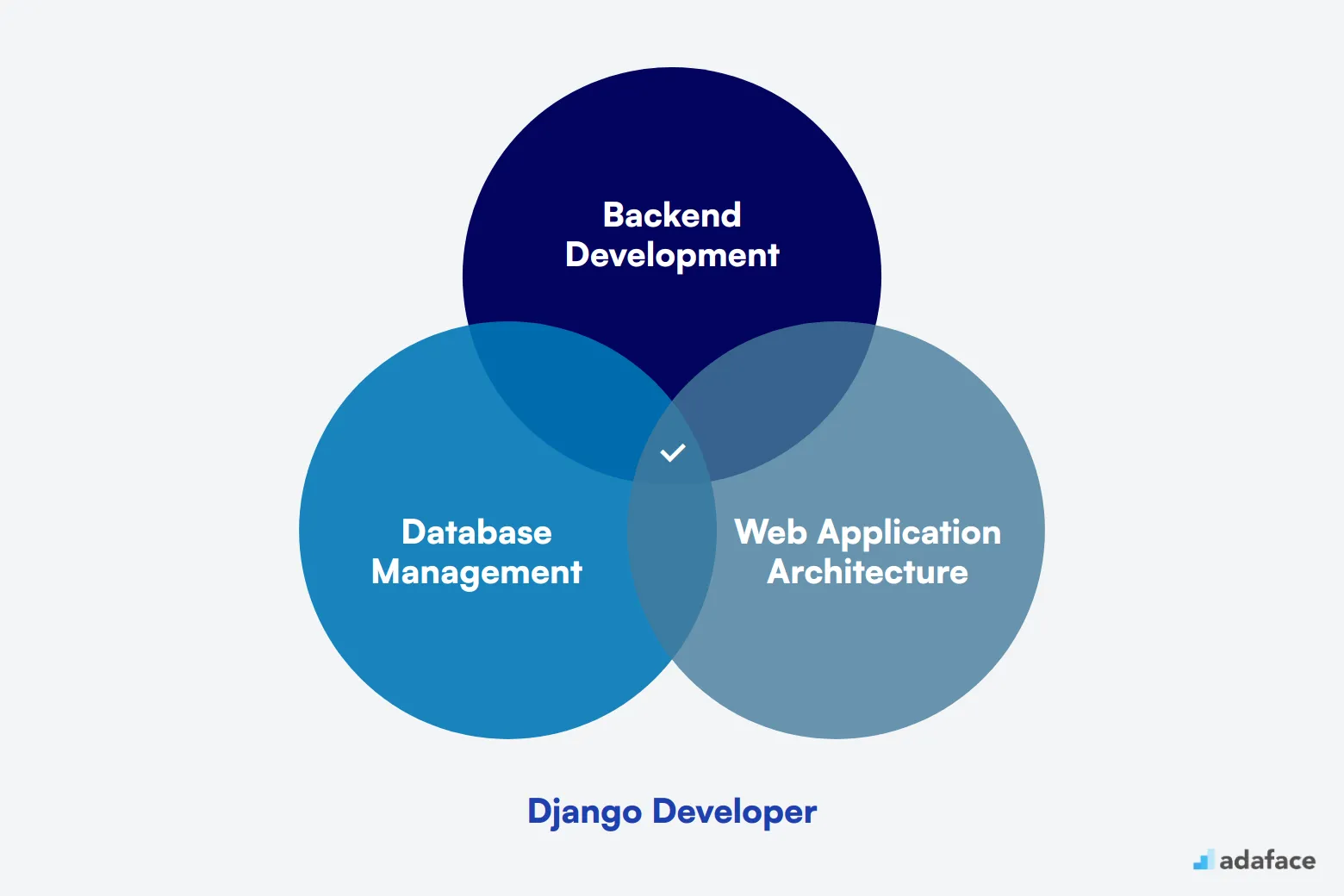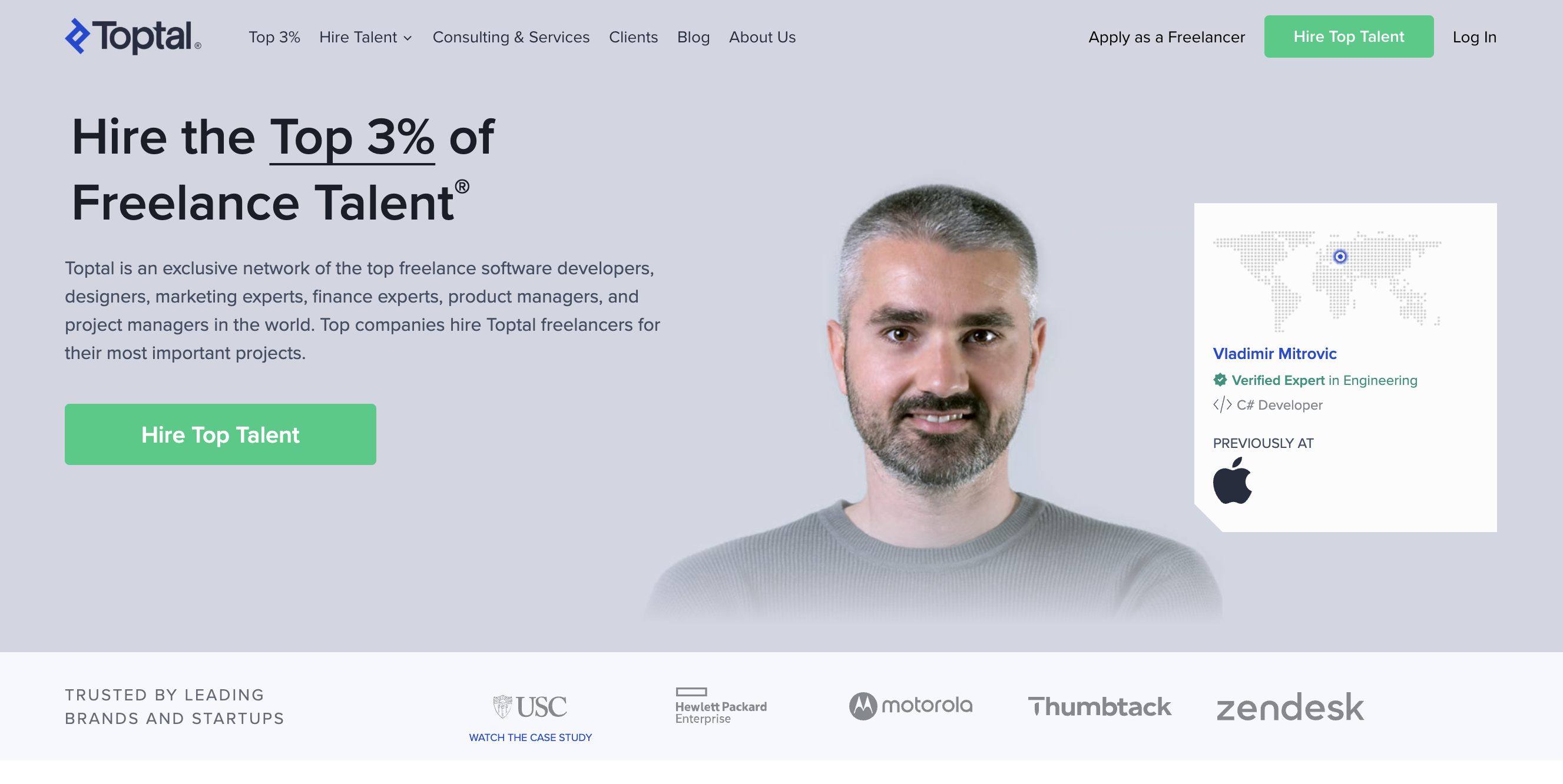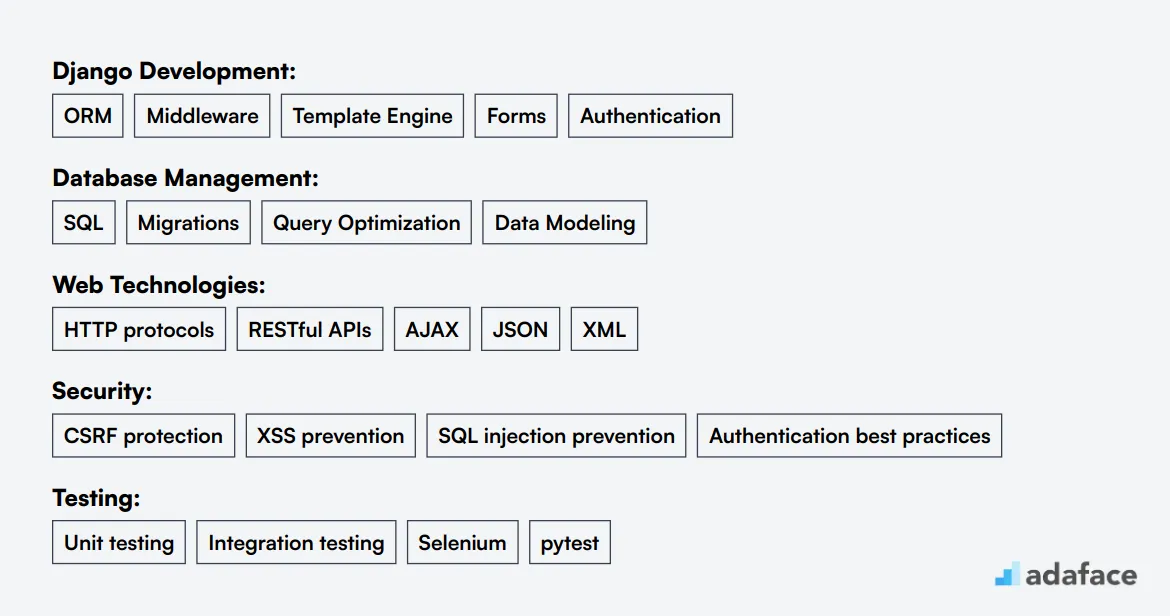Hiring Django developers can be a challenge for recruiters who aren't familiar with the technical nuances of this popular web framework. Many companies struggle to identify the right mix of skills and experience needed for their specific projects. The key is to understand not just the technical requirements, but also how a Django developer's expertise aligns with your business goals and development processes.
This guide will walk you through the process of hiring top Django talent, from understanding the role to conducting effective interviews. We'll cover everything you need to know to make informed decisions and build a strong development team. For a comprehensive overview of the skills to look for, check out our Django developer skills guide.
Table of contents
Why Hire a Django Developer?
Django developers can solve specific web development challenges your company faces. For instance, if you're struggling with slow database queries or need to build a scalable e-commerce platform, a Django expert can address these issues effectively.
Consider hiring a Django developer when:
- Your web applications require robust security features
- You need to handle high traffic volumes
- You want to rapidly prototype and deploy new features
Before committing to a full-time hire, assess if your project needs ongoing Django expertise. For short-term or specialized tasks, consider working with a consultant or using an assessment platform to evaluate potential hires.

Django Developer Hiring Process
The Django developer hiring process typically spans 4-6 weeks. Here's a quick overview of the timeline and steps involved:
- Post a well-crafted Django developer job description on relevant job boards
- Review resumes and portfolios (1-2 weeks)
- Conduct initial screening calls (3-5 days)
- Administer technical assessments (1 week)
- Hold in-depth technical interviews (1-2 weeks)
- Evaluate cultural fit and soft skills (2-3 days)
- Make an offer to the best candidate (1-2 days)
This process allows you to thoroughly assess candidates' Django skills, problem-solving abilities, and team fit. In the following sections, we'll dive deeper into each step, providing checklists and resources to help you find the perfect Django developer for your team.
Skills and qualifications to look for in a Django Developer
Hiring a Django Developer can be tricky, especially when it comes to defining the right candidate profile. What works for one company might not apply to yours. Therefore, it’s essential to distinguish between must-have and preferred qualifications to better align with your team’s needs.
Here are some common required skills that should be on your radar:
- Proficiency in Python programming language
- Strong understanding of Django framework and its components
- Experience with database systems (e.g., PostgreSQL, MySQL)
- Knowledge of HTML, CSS, and JavaScript
- Familiarity with version control systems (e.g., Git)
In addition to the requirements, consider these preferred qualifications to enhance your candidate pool:
- Experience with RESTful API development
- Understanding of front-end frameworks (e.g., React, Vue.js)
- Knowledge of containerization and deployment (e.g., Docker, Kubernetes)
- Familiarity with Agile development methodologies
- Experience with cloud platforms (e.g., AWS, Google Cloud)
By clearly laying out these skills and qualifications, you set a solid foundation for attracting suitable candidates. Each company has unique needs, so adjusting the list based on your specific context can yield better results. For further assistance in identifying these skills, consider exploring skill mapping.
| Required skills and qualifications | Preferred skills and qualifications |
|---|---|
| Proficiency in Python programming language | Experience with RESTful API development |
| Strong understanding of Django framework and its components | Understanding of front-end frameworks (e.g., React, Vue.js) |
| Experience with database systems (e.g., PostgreSQL, MySQL) | Knowledge of containerization and deployment (e.g., Docker, Kubernetes) |
| Knowledge of HTML, CSS, and JavaScript | Familiarity with Agile development methodologies |
| Familiarity with version control systems (e.g., Git) | Experience with cloud platforms (e.g., AWS, Google Cloud) |
Top Platforms to Find Django Developers
Now that you have a well-crafted job description, it's time to share it on job listing sites to attract potential candidates. Posting on the right platforms can significantly increase your chances of finding skilled Django developers who fit your requirements.
Upwork
Great for hiring freelance Django developers for short-term projects or specific tasks. Offers a wide range of professionals with various levels of expertise.

Toptal
Ideal for finding top-tier freelance developers, including Django experts. Toptal screens candidates rigorously, ensuring high-quality talent for critical projects.

Perfect for recruiting full-time Django developers. Provides access to a vast network of professionals and allows for detailed job postings and candidate searches.

The remaining platforms offer unique advantages for different hiring needs. From tech-specific sites like Stack Overflow Jobs and GitHub Jobs to startup-focused AngelList, these platforms cater to various recruitment scenarios. For remote hiring, Remote.co is an excellent option, while Hired focuses on matching tech skills with job requirements. Consider using a mix of these platforms along with coding tests to ensure you find the best Django talent for your team.
How to Effectively Screen Django Developer Resumes
Screening resumes is a critical step in the hiring process to ensure you only interview the most promising candidates. With numerous applicants, it’s important to identify the right skills and qualifications that align with the Django developer role.

When manually screening, focus on keywords related to the core competencies needed for Django development. Look for proficiency in Python, a strong understanding of the Django framework, and experience with database systems like PostgreSQL or MySQL. Don’t forget to check for knowledge of web technologies such as HTML, CSS, and JavaScript.
Leverage AI LLMs, such as ChatGPT, for a more streamlined process. You can instruct the AI to highlight resumes containing specific keywords, making it easier to decide which candidates to move forward with.
Here's a sample prompt for AI screening:
TASK: Screen resumes to match job description for Django developer role
INPUT: Resumes
OUTPUT: For each resume, provide following information:
- Email id
- Name
- Matching keywords
- Score (out of 10 based on keywords matched)
- Recommendation (detailed recommendation of whether to shortlist this candidate or not)
- Shortlist (Yes, No or Maybe)
RULES:
- If you are unsure about a candidate's fit, put the candidate as Maybe instead of No
- Keep recommendation crisp and to the point.
KEYWORDS DATA:
- Python, Django, ORM, Middleware, Template Engine
- Database: SQL, PostgreSQL, MySQL
- Web: HTML, CSS, JavaScript, RESTful APIs
- Tools: Git, Docker, Kubernetes
For more insights on interview questions you might ask, explore Django developer interview questions or understand the skills required for Django developers.
Recommended Skills Tests to Assess Django Developers
Skills tests are an excellent way to accurately assess the abilities of Django Developers. These tests help recruiters ensure that candidates possess the necessary technical skills for the role. Here are some recommended tests from our Adaface test library:
Python-Django Test: This test evaluates the candidate's ability to build web applications using Django. It's perfect for assessing skills in template rendering, ORM, and middleware integration.
Django Online Test: Focused specifically on Django, this test measures the candidate’s understanding of framework-specific concepts, ensuring they can leverage Django in real-world projects.
Python Online Test: Since Django is built on Python, assessing the candidate’s Python skills is crucial. This test covers Python basics, data structures, and functions, ensuring a strong foundation in Python.
Backend Engineer Assessment Test: This test is broader and evaluates multiple backend technologies, including Django, to ensure the candidate can integrate Django within larger system architectures.
SQL Online Test: Since Django often interfaces with databases, this test checks the candidate's ability to write and optimize SQL queries, a necessary skill for data management in Django projects.
How to structure interview stage for hiring Django Developers?
After candidates pass the skills tests, it's important to bring them to the technical interview stage where their hard skills can be assessed thoroughly. While skills tests are great for filtering out unfit candidates, technical interviews help in finding the best suited candidates for the Django Developer role. Let's look at some sample interview questions that can help you evaluate them effectively.
Here are some recommended interview questions to consider: 1. What experience do you have with Django frameworks? This helps assess their practical knowledge of Django. 2. Can you explain the difference between a Django model and a form? Understanding these concepts is essential for web development. 3. How do you handle migrations in Django? This gives insights into their database management skills. 4. Describe a REST API and how you would implement it in Django. This checks their skills in API integration, which is often needed. 5. How familiar are you with using Django alongside databases like PostgreSQL? Strong database skills are often required, and you can explore more on PostgreSQL Interview Questions.
What's the difference between a Junior Django Developer and a Senior Django Developer?
The distinction between Junior and Senior Django Developers can often be confusing for recruiters. While both roles involve working with Django, their responsibilities and expertise levels vary significantly.
A Junior Django Developer typically has 0-2 years of experience and works on simple to moderate projects. Their code quality reflects a basic understanding of Django, and they usually follow established design patterns. In contrast, a Senior Django Developer boasts over 5 years of experience and handles complex, large-scale projects. They produce advanced, optimized code and are responsible for designing scalable architectures.
Here’s a quick summary of their differences:
- Experience Level: Junior (0-2 years) vs. Senior (5+ years)
- Project Complexity: Junior (Simple to moderate) vs. Senior (Complex, large-scale)
- Code Quality: Junior (Basic understanding) vs. Senior (Advanced, optimized)
- Architecture Design: Junior (Follows established patterns) vs. Senior (Designs scalable architectures)
- Team Leadership: Junior (Individual contributor) vs. Senior (Mentors juniors, leads teams)
- Problem-Solving Skills: Junior (Solves routine issues) vs. Senior (Tackles complex challenges)
- Django Ecosystem Knowledge: Junior (Core Django) vs. Senior (Django, DRF, Celery, channels)
- Database Optimization: Junior (Basic queries) vs. Senior (Advanced optimization, indexing).
Understanding these differences is essential for selecting the right candidate for your project and team dynamics. To enhance your hiring process, consider using tools like coding tests to assess the skills of potential developers.
| Junior Django Developer | Senior Django Developer | |
|---|---|---|
| Experience Level | 0-2 years | 5+ years |
| Project Complexity | Simple to moderate | Complex, large-scale |
| Code Quality | Basic understanding | Advanced, optimized |
| Architecture Design | Follows established patterns | Designs scalable architectures |
| Team Leadership | Individual contributor | Mentors juniors, leads teams |
| Problem-Solving Skills | Solves routine issues | Tackles complex challenges |
| Django Ecosystem Knowledge | Core Django | Django, DRF, Celery, channels |
| Database Optimization | Basic queries | Advanced optimization, indexing |
What are the ranks of Django Developers?
Django developers often have varying levels of expertise and responsibilities within an organization. Understanding these ranks can help recruiters and hiring managers make informed decisions when building their development teams.
Junior Django Developer: This entry-level position is for developers who have basic knowledge of Django and Python. They typically work on simpler tasks under supervision and are expected to learn and grow in their role.
Mid-level Django Developer: These developers have a few years of experience and can handle more complex projects independently. They often mentor junior developers and contribute to architectural decisions.
Senior Django Developer: With extensive experience, senior developers lead projects, make critical technical decisions, and solve complex programming challenges. They often collaborate with other teams and stakeholders to align development with business goals.
Django Tech Lead: This role combines technical expertise with leadership skills. Tech leads oversee multiple projects, mentor team members, and play a crucial part in setting technical direction for the organization.
Django Architect: At the highest level, Django architects design large-scale systems, make strategic technology choices, and ensure the scalability and maintainability of Django applications across the organization.
Hire the Best Django Developers for Your Team
We've covered the key aspects of hiring Django developers, from understanding their role to the hiring process, essential skills, and effective screening methods. By following these guidelines, you'll be well-equipped to find the right Django talent for your team.
Remember, the most important step in hiring Django developers is to use accurate job descriptions and skills tests to evaluate candidates. This approach ensures you're assessing the specific Django and Python skills needed for your projects, leading to more successful hires and stronger development teams.
Django Online Test
FAQs
Key skills for Django developers include proficiency in Python, understanding of Django framework, knowledge of databases (especially PostgreSQL), familiarity with RESTful APIs, version control systems like Git, and front-end technologies such as HTML, CSS, and JavaScript. For a detailed list, refer to our Django developer skills guide.
You can assess Django developers' skills through coding tests, technical interviews, and portfolio reviews. Consider using our Django online test to evaluate candidates' practical skills efficiently.
You can find Django developers on job boards, tech-specific platforms like GitHub and Stack Overflow, professional networking sites, Django community forums, and tech meetups. Additionally, consider working with specialized tech recruitment agencies or leveraging your company's network.
Senior Django developers typically have 5+ years of experience, deep understanding of Django's architecture, ability to optimize performance, lead projects, and mentor junior developers. Junior developers usually have 0-2 years of experience and focus on basic Django functionalities and following established patterns.
Structure your interview process with an initial screening call, a technical assessment (like our Python Django test), a coding challenge, and an in-depth technical interview. Consider also including a culture fit interview and a final interview with the team lead or CTO.
Common interview questions cover Django's MTV architecture, ORM, migrations, middleware, and security features. For a comprehensive list, check out our Django developer interview questions guide.
To ensure a good fit, assess both technical skills and soft skills like communication, problem-solving, and teamwork. Use behavioral questions, team interviews, and trial projects to gauge how well the candidate will integrate with your existing team and work culture.

40 min skill tests.
No trick questions.
Accurate shortlisting.
We make it easy for you to find the best candidates in your pipeline with a 40 min skills test.
Try for freeRelated posts
Free resources



